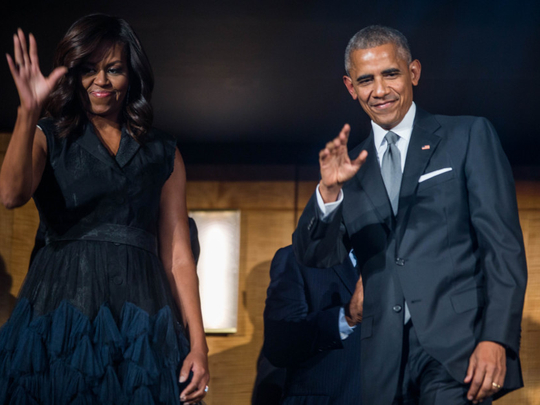
In his last speech to the United Nations General Assembly, United States President Barack Obama looked more of an academic lecturer in a well-established university than a presidential leader of the most powerful country in the world. One cannot but reach such a conclusion having watched him deliver his speech at UN in New York last week. Many people, including those in the Middle East, particularly in Syria, were highly disappointed. Inaction is no longer morally acceptable nor humanely tolerable at a time when even humanitarian aid is sadly prevented from reaching almost two million people caught up by the Damascus regime’s vicious bombardment of the bleeding city of Aleppo, most likely with Russian help.
The United Kingdom-based Syrian Observatory for Human Rights, trusted for its accurate citing, has recently reported that 14 air strikes had hit Aleppo’s opposition-held southern Bustan Al Qasr district and neighbouring Al Kallaseh, in one day. The observatory’s director, Rami Abdul Rahman described the bombardment as “the most intense strikes in months”, where internationally illegal “incendiary phosphorus bombs” were used. Prior to that, Aleppo had badly suffered from a deadly attack on an aid convoy and a Syrian Red Crescent warehouse week before last.
This is not a call on Obama to send troops to Syria to end the bloodshed there, but rather it is a desperate cry for help by a nation that is being torn apart mostly by regional and world powers, namely Russia, Iran and Turkey, with each having different purposes from the others. What’s been happening in Syria over the last five-and-a-half years is often wrongly described as “civil” or “sectarian” war. It is not. This so-called civil war has not come around yet.
In fact, as it is commonly known, there are several wars, simultaneously taken place. It is war by proxies.
On its part, Iran is known to have moved around 60,000 troops into Syria, particularly along the territories stretching from Latakia in the north-west to the country’s capital, Damascus, with the sole aim of shoring up the regime. With the support of the Iranian “revolutionary Guards”, Tehran is reported to have moved no less than 10,000 fighters belonging to the Lebanese militia Hezbollah northwards to help in the fight to recapture the Eastern part of Aleppo so far in the hands of various opposition factions.
The Iranian regional interventionist policy does not stop in Syria, but it stretches to other areas in the region, specially Lebanon and the Gulf.
Tehran, through its proteges’ militia is holding Lebanon to ransom by allowing Hezbollah members of the Lebanese Council of Deputies (parliament) to veto the overdue process of electing a new president for the country for almost two years.
In the Gulf, Iran is fighting a battle far away from home and as far as Yemen to undermine Saudi Arabia and other Gulf states in the region. With all its rhetoric about fighting the “Zionist enemy”, Iran’s intervention in this manner in the region on such a scale hinders the future of the Arab region and its potentials in moving towards stability.
On the other hand, Russia is thought, since September 2015, to have deployed dozens of strike aircraft and jet fighters into its old, but lately modernised, air base of Hmeimim, near Al Qirdaha village, in the outskirt of the coastal city of Latakia.
According to information obtained by journalists hosted by Moscow after the liberation of the ancient Semitic city of Palmyra (known in Arabic as Tadmur) in the north-east of Damascus from Daesh (the self-proclaimed Islamic State of Iraq and the Levant), revealed a picture that reflects Russian presence in Syria is there to stay. Russians seem to have built up substantial ground forces of several thousand troops in various locations within the country, equipped with modern weaponry and infrastructure. Additionally, Russian air power in Syria is considered to be of strategic nature.
On his part, Turkey’s President Recep Tayyip Erdogan has enjoyed almost a free hand for the most part of the last five years. He has not only moved his troops in many areas in northern Syria, giving the impression that his purpose is to topple the regime of Syrian President Bashar Al Assad, but his intervention has also been dangerously shaped by allowing several thousands of hard-core fighters to cross over through Turkish borders to Syria.
However, his policy has entirely been reversed recently, following the failed coup attempt against his government last July. Erdogan, unfortunately, is currently moving in tandem and full partnership with his Russian counterpart, President Vladimir Putin, and the Iranian leadership in dealing with the Syrian tragedy. Changing the regime in Damascus is no longer a priority as Erdogan’s new partnership is providing the Turkish president with the much-needed international and regional cover to solely concentrate his efforts to kill off any hope for the Kurds to have a country that they can call their own in the foreseeable future.
Obama’s reluctance to get involved in this tragic war more effectively, is in itself tragic. Despite his attempt to air some sense of optimism for the future, he has successfully managed to paint a very sad picture of world affairs, engulfed by sheer defeatism.
Mustapha Karkouti is a former president of the Foreign Press Association, London. You can follow him on Twitter at www.twitter.com/@mustaphatache








